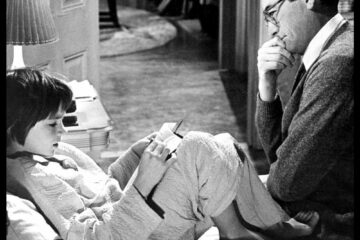Welcome to this special coronavirus quarantine edition of my blog.
While this post lacks my usual book and movie recommendations, there are some life lessons with levity.
Decades ago, Kurt Vonnegut said, “How should we behave during this Apocalypse? We should be unusually kind to one another, certainly. But we should also stop being so serious. Jokes help a lot.”
Top Ten Tips for Working at Home
Many of us are working at home now. I got a head start.
In February, I returned from visiting clients in Jakarta, via Tokyo, and went into a 14-day quarantine. People were becoming concerned about this coronavirus thing.
Just as I was ready to return to the office and reconnect with colleagues, everything went online so we could work remotely.
Shortly thereafter, Governor Inslee began issuing public health directives. “Non-essential” people were quarantined. Lawyers, apparently, are non-essential.
Suddenly toilet paper was hoarded. Memes flooded Facebook. The end times seemed near.
Here is some good news though. Working remotely works. At our firm, we’re serving clients, accepting clients, and doing our jobs. Along isolation road, however, we learned some lessons.
There are challenges to working at home. For example, there is no IT department at my house. There is a distracting nine-and-a-half-year-old. Nonetheless, I’ve found ways to carry on.
Here are my top ten tips:
10) Create a home workspace.
This should not be your bed.
9) Start your day with a checklist.
Checklists have a double benefit. One, lists help you focus. Two, every time you check something off your list you earn a surge of dopamine. You can get the same rush from exercising, but checklists don’t make you sweat.
8) Maintain contact with people.
According to research, loneliness is one of the top challenges of working at home. Still, now is not the time to organize a rockin’ block party. Instead, try group chats, make phone calls, use FaceTime, discover Zoom. Please wear pants during any sort of video conferencing.
7) Communicate with colleagues.
Organizations have a collective knowledge that naturally spreads like, well, a virus. Whether it’s a hallway dialogue, a lunch break, or simply hanging out and sharing war stories, we are constantly exchanging information. When everyone is working remotely, we lose this. Call your colleagues. Ask about the weirdest thing that happened that day. Be grateful for the stories. I’m adding a chapter to my memoir.
6) Stick to a schedule.
Psychologists consistently recommend a regular schedule as crucial for productivity and mental health. Schedules make us more efficient, reduce stress, and instill good habits. Further, schedules give us the illusion of control, which is particularly comforting during apocalyptic times. Your schedule should include time for things like helping your children with homework, lunch, and exercise. Ironically, many of us find ourselves working longer hours at home because there is no end time. Your schedule should also include happy hour.
5) Cut down on news.
You save time. You avoid toxicity. You tune out annoyances. You’re happier. Studies show news triggers your limbic system in noxious ways, stressing your body and dimming your mind. You will hear enough about disease, death, and doom without clicking coronavirus links eleven times a day.
4) Listen to music.
Lawyers should tell their clients this more often. Music, as Kurt Vonnegut noted, is the greatest of the arts. Science confirms what we already know. Music reduces stress, inspires creativity, lifts our spirits, and even supports our immune system. Music is a miracle drug. If you play an instrument, break it out. I did. I’m practicing the three chords I know and may even learn a fourth.
3) Hydrate and meditate.
This is one of my mantras. Among other essential functions, water flushes out toxins and strengthens your immune system. You function better. Your skin looks better. You feel better. What water does for your body, meditation does for your mind. We need calm heads for The End of the World as We Know It.
2) Read.
I do not mean Facebook memes like the one of Hannibal Lector with the caption, “If we run out of food, we still have each other.” I mean books. Personally, I’m re-reading Meditations by Marcus Aurelius. “At dawn, when you have trouble getting out of bed, tell yourself, ‘I have to go to work as a human being. What do I have to complain of if I’m going to do what I was born for?’”
1) Don’t wear pajamas.
Laurence Olivier said you can play any part with the right costume. Clothes affect how others perceive you and, more importantly, how you perceive yourself. So my number one tip is this: do not wear pajamas during work hours. Don’t do it. Thank you.
Oh, and more thing that was pointed out to me by Peter Farrelly: muumuus are the same as pajamas.
I’m an optimist and I’m confident the Republic will survive. Remember, the Renaissance followed the Bubonic Plague.
Stay safe. Stay sane.
Tip Eleven
As we know from the rockumentary movie Spinal Tap, eleven is somewhere beyond ten. “This one goes to eleven.”
So here is my eleventh tip: crisis equals opportunity.
President John F. Kennedy, and politicians who followed his lead and borrowed his tropes, have been criticized for saying, “When written in Chinese, the word ‘crisis’ is composed of two characters. One represents danger and the other represents opportunity.” Apparently, this is not technically correct.
While Kennedy may have been off on his linguistics, he was spot on about life.
Thanks for reading.


